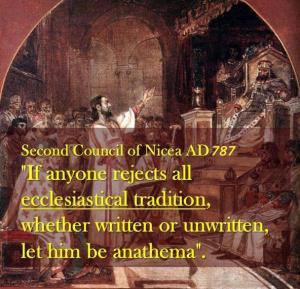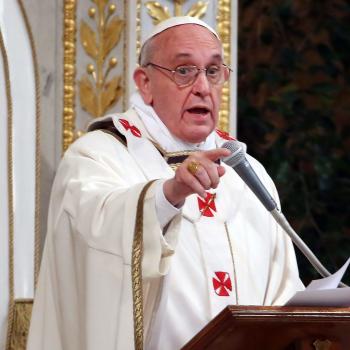 Once I lost two of the five solas of the Reformation, I was back on the pathway to being Catholic. Back when I originally wrote this series of articles in 2011, it bothered me how inconsistent most Protestant theology is with itself. This is what happens, I think, when the organization on the whole just tosses Tradition in the bin.
Once I lost two of the five solas of the Reformation, I was back on the pathway to being Catholic. Back when I originally wrote this series of articles in 2011, it bothered me how inconsistent most Protestant theology is with itself. This is what happens, I think, when the organization on the whole just tosses Tradition in the bin.
I strongly believe in consistency — hermeneutics should be consistent, interpretations of passages should incorporate what has gone before, and your bar of acceptable proof should be even across all areas of your life. Protestantism just isn’t consistent. One of the most egregious inconsistencies is to reject Catholic Tradition on the grounds that it developed “later” than apostolic times. Examples:
- Marian dogmas originated in the mid to late second century
- The papacy developed over a few hundred years to solidify in the sixth century
- Clerical vestments were developed in the tenth century
All are rejected because none date back to the time of the apostles. Now, if Protestants were consistent, a few of their own doctrines should go. Examples:
- The 6,000 year old earth concept developed in the sixteenth century
- The Rapture originated in 1850
- Altar calls started in the late 1800s
Note that these come even later than any Catholic distinctive I used as an example above. Not all Protestants believe these. But it’s hard to come up with “universal” doctrine because there are none among Protestants. But before Protestantism, Jesus Christ founded one universal church. Therefore, it is wholly inconsistent to throw out vast quantities of Sacred Tradition for lacking the historical understanding of the evolution of the Christian faith. Protestants eliminate or downplay their own teaching authority. This results in no certainty, only a range of possibilities.
Before I could embrace my Catholic roots again, I had to jump a couple of hurdles. First was resolving High Church with Private Judgement. The second involved understanding doctrines I wholly disagreed with and that I didn’t think I could bring myself to accept. The answer to the first became the key to the second, as I will discuss in my next post.











